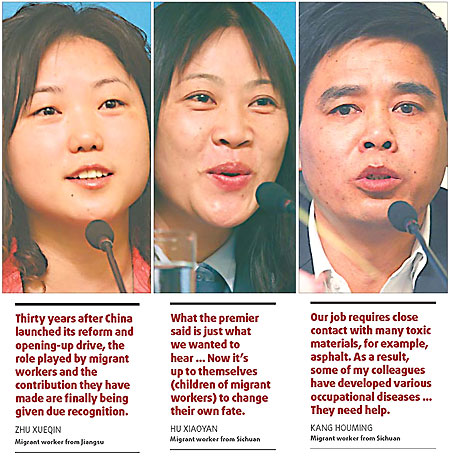 |
|
Migrant workers make a move to the Hall
By Zhao Xu (China Daily) Updated: 2008-03-07 07:16 When migrant worker Zhu Xueqin was elected a deputy to the National People's Congress, excited dormitory mates asked for one favor. "They asked me to record whatever the premier says and bring it back to them," said Zhu, who was elected from Shanghai.  And to make sure, they bought him a mini recorder. Zhu shared this intimate detail with a roomful of reporters who gathered at Beijing's Media Centre yesterday to ask questions of the NPC's 10 "grassroots delegates" - street cleaners, construction workers and assembly line workers. Of the 10, it was the three migrant workers who attracted the most attention, perhaps inevitable given this was the first time migrant workers were elected to the NPC.
In his keynote speech at the NPC's opening session on Wednesday, Premier Wen Jiabao talked at length about extending social welfare, including medical insurance, old-age pension and low-rent housing, to this group of people that constitute more than 13 percent of the country's population. "More than many others, we need medical and workplace injury insurance," said Kang Houming, one of the three migrant worker delegates who spends most of his waking hours at a construction site in Chongqing. "Our job requires close contact with many toxic materials, for example, asphalt. As a result, some of my colleagues have developed various occupational diseases," the native of Sichuan province said. "They need help." As the country tries to bridge the widening income gap, fair compensation to migrant workers is on the top of the government agenda. The Labor Contract Law, effective since January, makes it compulsory for companies to sign open-ended contracts with workers with more than two years' service and provide insurance and overtime pay. Another issue is education. Steps will be taken to ensure children of migrant workers in cities enjoy the same access to compulsory education as others, Wen said in his report. Hu Xiaoyan, the third migrant worker deputy and a mother of twin daughters, said both her children are studying in Foshan, Guangdong province, where she worked in a local factory. "Now it's up to themselves to change their own fate," said Hu, a native of Sichuan. "What the premier said is just what we wanted to hear," she said. And Zhu can carry that message back to his colleagues. |
|